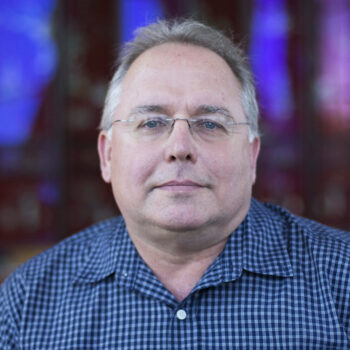
NERS Professor Alex Bielajew retires after 25 years with the department
Bielajew’s research focused on Monte Carlo code development.

Bielajew’s research focused on Monte Carlo code development.
Professor Alex Bielajew joined the Nuclear Engineering & Radiological Sciences (NERS) department in the mid-1990s, first as a visiting professor from Canada, before joining the permanent faculty in 1997. His research is in the area of Monte Carlo code development, studying variance reduction in the method, then developing Monte Carlo codes for the calculation of electron transport, electron elastic multiple scattering, and radiation standards. He has also conducted research on the theory of ionization chambers and theories for modeling radiation dose deposition for medical physics purposes.
Bielajew obtained his BSc in physics from McGill University in 1978. He was awarded the prestigious Canadian Centennial Postgraduate Scholarship and graduated from Stanford University in 1982 with a PhD degree in theoretical physics. Upon graduation, Professor Bielajew joined the Division of Physics at the National Research Council of Canada (NRCC). During his 15 years there he developed and managed the well-known EGS (Electron Gamma Shower Monte Carlo code) software package used by researchers worldwide to simulate radiation interactions. His PRESTA algorithm, used for simulating electron transport, became a Citation Classic paper, a significant achievement in physics. He is a Fellow of the United Kingdom’s Institute of Physics (1999) as well.
“Professor Bielajew was a great, really funny guy. His first couple lectures were very helpful, after that I mainly learned from labs.”, said one of his former students. “His class is admittedly much easier than the other 101 sections, but I came in with no programming experience and now I feel pretty confident in my abilities.” While another student said, “As a freshman with no prior coding experience, Professor Bielajew made the transition into C++ and Matlab very easy. I learned more in the laboratory section than I did in lecture, but Bielajew was enthusiastic about teaching coding and did his job extremely well. I feel prepared for advanced coding courses after his C++ preparation.”
In his professional career, Bielajew has not only taught at U-M but also been a visiting professor (1999-2000) at the University of Barcelona, Spain, and an adjunct professor (1994-97) at Carleton University, Ottawa. He has organized and/or lectured at 16 courses, “Radiation Transport Calculations using EGS4” Ottawa(‘86,’87,’90), London(‘89,’93,’98) Edmonton(‘90,’92), Seattle(’92,’95), Brisbane(‘92), Linkoping(‘94), Capri(‘94), Montpellier, France(‘96), Tokyo(‘97), Adelaide(‘97). He has also been the co-chair/organizer of multiple conferences and served as the President of American Nuclear Society, Michigan Section (2000-01). He has won many awards throughout his productive professional career, including two Sylvia Fedoruk Prizes in Medical Physics (1989,1991).
In addition, Bielajew has published numerous papers on fundamental radiation dosimetry that laid the foundation for worldwide standards for radiation instrument calibration. The algorithms and computer codes he produced have been incorporated into nearly every commercial and research cancer therapy dose prediction, providing results that have benefited the lives of those patients. He was bestowed with an Achievement Award for improvement of international radiation standards for cancer therapy, National Research Council of Canada for his contribution.
But beyond conducting research, Professor Bielajew was a gifted educator and taught nearly 6,000 students at all levels during his teaching tenure. He chaired the Department’s Undergraduate Program and advocated tirelessly on behalf of students to provide educational opportunities and successful outcomes. On December 31, 2021, he retired from active faculty status in NERS.